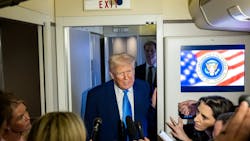Trump threatens to impose up to 250% tariff on pharmaceuticals in phased policy
In his latest push to return drug manufacturing to the United States, President Donald Trump on Tuesday threatened in an interview with CNBC to impose tariffs as high as 250% on pharmaceuticals imported to the U.S.
“We’ll be putting an initially small tariff on pharmaceuticals but in one year — one and a half years maximum — it’s gonna go to 150% and then it’s gonna go to 250%, because we want pharmaceuticals made in our country,” Trump said.
It’s the highest tariff rate Trump has threatened to levy on the pharmaceutical industry. In July, Trump said he would impose a 200% pharma-specific tariff, as part of his strategy to pressure drugmakers to increase domestic manufacturing, while providing a grace period of up to a year and a half to give manufacturers the opportunity to move their operations to the U.S.
Trump on Tuesday promised a pharma tariff announcement would be coming “within the next week or so” from his administration. An open question remains whether the hundreds of billions of dollars that large drugmakers have pledged cumulatively to build their respective domestic production capabilities would be enough to appease Trump.
Last week, the U.S. and European Union announced a trade agreement that includes 15% tariffs on most EU exports, including brand name pharmaceuticals. At the time, Trump and European Commission President Ursula von der Leyen appeared to differ on how their trade agreement addresses pharma-specific tariffs.
In Tuesday’s interview with CNBC, Trump again seemed to imply that pharmaceuticals in the EU trade deal would be subject later to a higher industry-specific U.S. tariff.
“This is a separate class than the 15% tariffs on sort of everything,” Trump said. “For 30 years, Europe has had drug prices that are in many cases one tenth the cost of drugs here — same manufacturing plants, same everything.”
The Trump administration has launched an investigation into whether the importation of certain pharmaceuticals and pharmaceutical ingredients may threaten U.S. national security. The probe is looking into the extent to which domestic production can meet demand, the feasibility of increasing U.S. capacity for pharmaceuticals and pharmaceutical ingredients to reduce import reliance, and whether tariffs are necessary.
John Murphy III, president and CEO of the Association for Accessible Medicines (AAM), told the BBC that he worries that if a 250% tariff is levied on pharmaceuticals, it is generic medicines — which make up 90% of all prescriptions filled in the U.S — that will be hardest hit. Murphy said there are some low-cost generic drugs sold in the U.S. market at prices barely covering the cost of production.
For those medicines, many of which are made in India, Murphy contends “even a low tariff in the 20% to 25% range could push that product into an unprofitable dynamic” with manufacturers faced with “a problematic choice — do you continue to sell a medicine at a loss, or take the medicine off the market?”
Asked if U.S. production could be scaled up to meet the demand for generics in the short term, Murphy said domestic manufacturers “acknowledge they don’t have the excess capacity to just tomorrow start making a thousand different medicines.”
About the Author
Greg Slabodkin
Editor in Chief
As Editor in Chief, Greg oversees all aspects of planning, managing and producing the content for Pharma Manufacturing’s print magazines, website, digital products, and in-person events, as well as the daily operations of its editorial team.
For more than 20 years, Greg has covered the healthcare, life sciences, and medical device industries for several trade publications. He is the recipient of a Post-Newsweek Business Information Editorial Excellence Award for his news reporting and a Gold Award for Best Case Study from the American Society of Healthcare Publication Editors. In addition, Greg is a Healthcare Fellow from the Society for Advancing Business Editing and Writing.
When not covering the pharma manufacturing industry, he is an avid Buffalo Bills football fan, likes to kayak and plays guitar.
